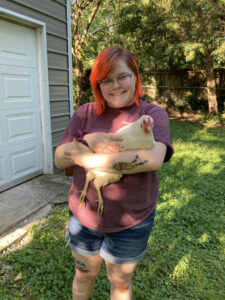In the spring of 2020, the world was turned upside down practically overnight. I remember the days leading up to spring break; rumors of the university shutting down had begun to circulate, but it didn’t feel like a real possibility until an email was sent to the student body telling us to bring all of our class materials home with us when we left. 
What was supposed to be a break lasting just over a week turned into two weeks, then three. Suddenly, all classes were online, most people returned home for the remainder of the semester, and those of us who decided to continue living on campus were few and far between. It was a strange, scary time as the whole world came to a standstill.
But I’m not here to tell you about the pandemic. I’m here to tell you about my part of the story, and how the ensuing semesters led to some of the biggest change I’ve seen in myself since I started attending MSU in fall of 2018.
After the university shut down, I went through a major decline in my mental health. Like many people, I felt very isolated, and the uncertainty of the situation weighed on me heavily. I was more depressed and anxious than I had ever been before, and my grades began to reflect just how poorly I was doing.
No matter what I did, it seemed as though there was a mental wall preventing me from completing my assignments, emailing professors, and even keeping up with my own self-care. I was spiraling, and I’m certain many people reading this can relate. I would spend hours staring at my laptop screen, wanting to do something, anything at all, but I just… couldn’t.
I blamed myself; I thought there was something wrong with me, that I was just lazy and avoiding my responsibilities because I didn’t care enough. I felt worthless. Eventually, however, I realized I needed help to fix the mess I had found myself in.
Somehow, I was finally able to break through my inertia and reach out for help. I emailed professors about my grades, switching many of my classes to the pass/fail option the university began offering for people like me who had struggled when everything went online. I also reached out to the Counseling Center on campus, and I began to slowly improve as time went on.
I entered the next fall feeling much better mentally, but I was still struggling to manage my class work, organization requirements, and social life. I felt scattered, stretched too thin and like I was always running behind. It was absolutely exhausting, and I wasn’t sure what to do, but I knew something had to change.
I knew at this point that I was truly trying my best to keep up with everything, and yet, I still felt as though I was swimming against the current; I was putting in all my effort, but I wasn’t going anywhere. After more counseling sessions, visits with doctors, and an evaluation from a psychiatrist, I finally had an answer. In October of 2020, I was diagnosed with primarily inattentive-type ADHD.
Most people hear “ADHD” and immediately picture hyper little boys being disruptive in class, but it is so much more than that. It impacts short-term memory, executive functioning skills like prioritizing tasks or keeping track of time, and is even linked to balance and motor control, as well as higher rates of chronic illness.
Untreated ADHD can even cause other mental health issues like depression and anxiety. It’s a disorder with a far, far reach, and I have had it all my life without knowing because I didn’t have all the responsibilities I do now as a child. I didn’t have to manage everything on my own until I came to college, and that’s when I truly began to struggle.
The diagnosis changed everything for me. I finally knew why I was having such a difficult time and began seeking out methods of managing life that actually worked for me. I learned to set timers for myself, utilize visual reminders of tasks, and how to study in a way that engaged my brain in a more effective way.
I am still learning more and working to improve every single day, but I can truly say that reaching out for help was the thing that truly changed my life for the better. If I hadn’t gotten help, I would still be stuck in the dark place that I entered in the spring of 2020, and there is no telling how long I would have stayed in that darkness, feeling worthless and hopeless.
The moral of my story is to be brave and ask for help. It’s no easy thing to do, but there is no shame in it, and there are so many people around you that want to see you get better, that want to help you thrive.
In life, it’s natural to have struggles and problems, but that doesn’t mean you have to do it alone. This community will do everything it can to help you succeed, all it takes is a bit of bravery to ask for the help you need.
(submitted by Jenny Burrow, SOAR Leader | Bonner Leader/Program Assistant, Center for Community Engagement | Wildlife Biology|Sign Language Studies | Missouri State University)
